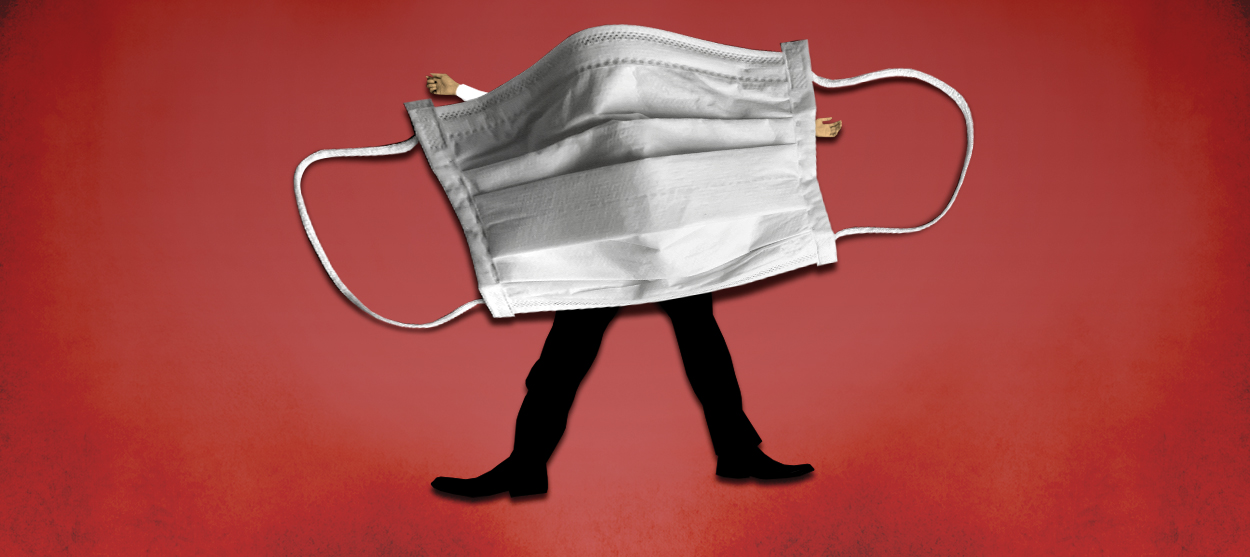How the government wasted our pandemic sacrifices
We're double-masking because the government blames its failures on us


A free daily email with the biggest news stories of the day – and the best features from TheWeek.com
You are now subscribed
Your newsletter sign-up was successful
A few weeks into the pandemic, a woman in my neighborhood set up a mask-making station. She asked neighbors to drop off spare thread, fabric, elastics, even a spare sewing machine, and she started making masks for all of us. At the outset of the pandemic, her scrappy operation was a testament to Americans' willingness to care for each other. But now, when I go for walks and observe people still wearing cloth masks, I see a policy failure.
After a year of coronavirus, it's a scandal that the Centers for Disease Control and Prevention's message to Americans is to consider double masking. It's not that the science is wrong — two low-quality masks are meaningfully better than one. But there's no reason Americans should still be making do with low-quality masks. U.S. manufacturers have stepped up to produce high-quality N95 masks, the kind that really can protect you from others, as well as protecting others from you, and their work is going to waste.
Throughout the pandemic, Americans have made extraordinary sacrifices to slow the spread of the virus. We haven't been unequal to the disaster, but our leaders' lapses have left people filling in the gaps of the lackluster federal and state responses. Yet with each surge comes scolding about individual choices, while first former President Donald Trump and then President Biden have minimized the centralized work only the government can do.
The Week
Escape your echo chamber. Get the facts behind the news, plus analysis from multiple perspectives.

Sign up for The Week's Free Newsletters
From our morning news briefing to a weekly Good News Newsletter, get the best of The Week delivered directly to your inbox.
From our morning news briefing to a weekly Good News Newsletter, get the best of The Week delivered directly to your inbox.
This sleight of hand is part of a pattern. Our leaders love to valorize individual effort, especially when it suggests policy reform is unnecessary. When a child saves up his allowance to pay back his classmates' lunch debt, it's not a feel good story, much less a universal way to ensure every student has enough to eat. After graduating into a recession, millennials can't catch up by avoiding avocado toast and lattes. The environment won't be saved by banning plastic straws, rather than seriously considering nuclear power.
In each case, these stories shift the blame to individuals — if they really cared about getting out of debt or cleaning up the environment, shouldn't they be visibly suffering in pursuit of the goal? If not, what right do they have to demand that anyone else take action?
During the summer, beachgoers were shamed for going swimming, with some news organizations using misleading photos to imply they weren't social distancing. But being outdoors in the open air was one of the safest ways to socialize. The virus isn't a horror movie villain, stalking victims to punish them for having fun. And yet, the more people went outside during the summer, the more they were treated like the problem. Meanwhile, the government wasted the summer failing to ramp up testing capacity and underfunding ventilation upgrades for schools.
One year after lockdowns began, coronavirus vaccines are safe, reliable, and remarkable. But in their botched rollout, the government has once again delegated its job to individuals. VaccinateCA, a community-run volunteer website, is a more reliable way to find appointments in California than the official websites. The vaccine scheduling site in Washington, D.C., crashed for three straight days, while councilmembers took to Twitter to give instructions that had been left off the official page.
A free daily email with the biggest news stories of the day – and the best features from TheWeek.com
When volunteer organizations outstrip the official response, the government might be tempted to further shrink its role. Instead of ensuring people who are eligible for foodstamps receive the benefits they're entitled to, the government can point at private charities that sign people up. But these laudable, private efforts don't excuse central failures.
There is work that must be done centrally. Only the government can authorize and fund rapid, at-home tests for coronavirus, which would let asymptomatic or presymptomatic carriers know they should isolate. It would lift the lockdown burden on the majority of Americans. But it takes money and FDA approval to get off the ground.
Only the government can use the Defense Production Act to guarantee purchases of N95 masks so American manufacturers can scale up and distribute high-filtration masks. Instead, the Biden administration is sending 25 million cloth masks to community health centers, food pantries, and soup kitchens.
The end of the pandemic is in sight. But in between now and herd immunity, a lot of people are going to die preventable deaths, and be mourned by families who still can't gather for funerals. The bare minimum begins with fixing vaccination registration sites, so that access stops working like a secret menu, where you need to know the right times and tips to get through. Clear that basic bar of competence, and then expand vaccination to seven days a week with longer hours, send out masks and tests, and prep surveillance testing so we can catch the next variant and tweak our vaccines accordingly.
What we have now is governance theater, no more credible than the hygiene theater that sees schools faithfully wiping down surfaces long after we've learned that the virus is primarily spread through the air. In our pandemic response, in economic policy, in environmental planning, symbolic gestures won't cut it.
We can't let individual sacrifice be wasted by politicians intent on acting more like cheerleaders than policy makers.
Leah Libresco Sargeant is the author of Arriving at Amen and Building the Benedict Option. She is a former news writer for FiveThirtyEight.
-
 Corruption: The spy sheikh and the president
Corruption: The spy sheikh and the presidentFeature Trump is at the center of another scandal
-
 Putin’s shadow war
Putin’s shadow warFeature The Kremlin is waging a campaign of sabotage and subversion against Ukraine’s allies in the West
-
 Media: Why did Bezos gut ‘The Washington Post’?
Media: Why did Bezos gut ‘The Washington Post’?Feature Possibilities include to curry favor with Trump or to try to end financial losses
